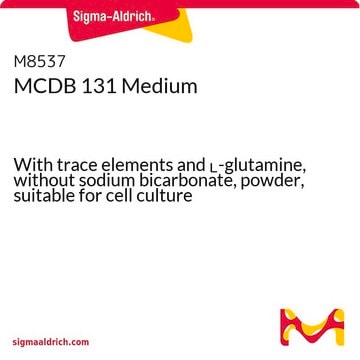Összes fotó(1)
Fontos dokumentumok
M6770
MCDB 201 Medium
With trace elements, L-glutamine and 30 mM HEPES, powder, suitable for cell culture
Szinonimák:
MCDB medium
Bejelentkezésa Szervezeti és Szerződéses árazás megtekintéséhez
Összes fotó(1)
About This Item
UNSPSC kód:
41161501
NACRES:
NA.75
Javasolt termékek
Minőségi szint
form
powder
technika/technikák
cell culture | mammalian: suitable
alkatrészek
HEPES: 7.149 g/L (30mM)
glucose: 1.441 g/L (Dextro)
phenol red: 0.001242 g/L
sodium pyruvate: 0.055 g/L
L-glutamine: 0.14615 g/L
kiszállítva
ambient
tárolási hőmérséklet
2-8°C
Általános leírás
MCDB 201 medium is a modified Ham′s nutrient mixture F-12 that is synthesized for the clonal growth of chicken embryo fibroblasts.
Alkalmazás
MCDB 201 Medium has been used as a component of:
- the hepatic differentiation medium to culture pluripotent stem cells,
- epididymal growth medium for culturing of preadipocytes,
- Dulbecco′s Modified Eagle Medium (DMEM)/F12 for culturing of human umbilical cord mesenchymal stem cells
Mennyiség
Formulated to contain 17.7 grams of powder per liter of medium.
kiegészítés
Tárolási osztály kódja
11 - Combustible Solids
WGK
WGK 1
Lobbanási pont (F)
Not applicable
Lobbanási pont (C)
Not applicable
Analitikai tanúsítványok (COA)
Analitikai tanúsítványok (COA) keresése a termék sarzs-/tételszámának megadásával. A sarzs- és tételszámok a termék címkéjén találhatók, a „Lot” vagy „Batch” szavak után.
Már rendelkezik ezzel a termékkel?
Az Ön által nemrégiben megvásárolt termékekre vonatkozó dokumentumokat a Dokumentumtárban találja.
Az ügyfelek ezeket is megtekintették
Jeff Ishibashi et al.
Molecular and cellular biology, 32(12), 2289-2299 (2012-04-05)
Fibroblastic preadipocyte cells are recruited to differentiate into new adipocytes during the formation and hyperplastic growth of white adipose tissue. Peroxisome proliferator-activated receptor γ (PPARγ), the master regulator of adipogenesis, is expressed at low levels in preadipocytes, and its levels
Philip Roelandt et al.
Methods in molecular biology (Clifton, N.J.), 997, 141-147 (2013-04-03)
Differentiation of human stem cells to hepatocytes is crucial for industrial applications as well as to develop new therapeutic strategies for liver disease. The protocol described here, using sequentially growth factors known to play a role in liver embryonic development
Baris Ulum et al.
Journal of cellular physiology, 233(11), 8429-8436 (2018-05-26)
Bone marrow mesenchymal stem cells (BM-MSCs) are promising candidates for regenerative medicine purposes. The effect of obesity on the function of BM-MSCs is currently unknown. Here, we assessed how obesity affects the function of BM-MSCs and the role of endoplasmic
Jeff Ishibashi et al.
Molecular and cellular biology, 32(12), 2289-2299 (2012-04-05)
Fibroblastic preadipocyte cells are recruited to differentiate into new adipocytes during the formation and hyperplastic growth of white adipose tissue. Peroxisome proliferator-activated receptor γ (PPARγ), the master regulator of adipogenesis, is expressed at low levels in preadipocytes, and its levels
Philip Roelandt et al.
PloS one, 5(8), e12101-e12101 (2010-08-17)
Stem cell-derived hepatocytes may be an alternative cell source to treat liver diseases or to be used for pharmacological purposes. We developed a protocol that mimics mammalian liver development, to differentiate cells with pluripotent characteristics to hepatocyte-like cells. The protocol
Tudóscsoportunk valamennyi kutatási területen rendelkezik tapasztalattal, beleértve az élettudományt, az anyagtudományt, a kémiai szintézist, a kromatográfiát, az analitikát és még sok más területet.
Lépjen kapcsolatba a szaktanácsadással









